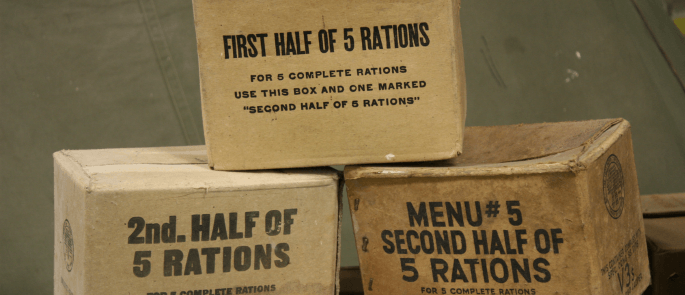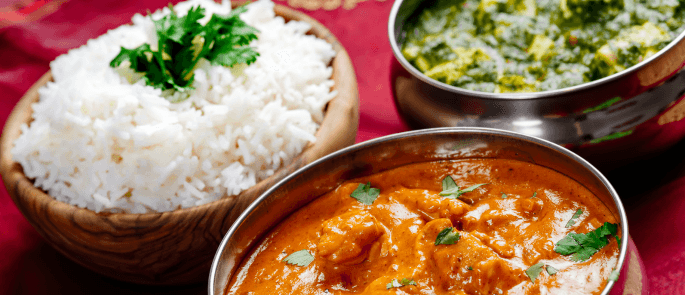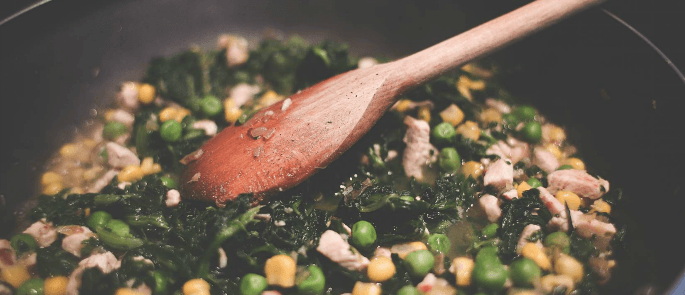How Do You Know If You Need An Oil Change
Tin you learn from your grandparents' food choices and lifestyle?
Over the last century, our eating habits accept changed dramatically, with our diets condign almost unrecognisable to those of our grandparents and great-grandparents. The way nosotros shop, cook and dine has been altered by our attitudes towards food – nonetheless is the modernistic manner the better way?
Here nosotros look at the changing habits and compare our grandparents' food choices with our own.
A Strict Weekly Routine
Compare your grandparents' attitude towards meal times with your ain: how do they differ? Chances are your grandparents had a much stricter routine than yous do at present. Fifty to eighty years agone it was typical for a family to accept their meals at the same fourth dimension every solar day (breakfast at 7 am, tiffin at 12 pm and dinner at 5 pm) and so your trunk was accustomed to knowing when to expect food. This sort of subject area helped to keep waistlines slim and food waste to a minimum. In the mod day, however, a lot of people accept lost this disciplined approach to meals and no longer stick to the 3-square-meal-a-day rule. Skipping breakfast, snacking and several cups of java a day are notions that our grandparents would never take considered. How do you lot think this affects your lifestyle? Which approach do y'all think is the nigh benign to your health?

The weekly routine didn't end there either – it's likely that your grandparents besides had a strict rota when it came to what they ate on which twenty-four hours of the week. It was often the instance that the family ate a roast dinner on Dominicus, followed past leftover cold meat on a Monday, and so whatsoever further leftovers made into a pie or other dish for Tuesday, Wednesday and Thursday. Most families as well followed the routine of having fish and chips on a Fri. The weekly nutrient rota was very much ever the aforementioned, using up all leftovers and serving them with fresh vegetables every night. Whilst people oftentimes didn't accept a huge multifariousness of choice, it was truthful that people e'er ate freshly prepared meals and vegetables on a regular basis.
Today, however, we are surrounded by choice. Non only do we get to choose when we eat our food, only we are likewise provided with a vast choice of food choices. Takeaways, fast-food and set up meals have changed the style that meals are prepared and eaten. Why bother spending hours cooking upwards a shepherd's pie with yesterday's leftover beef and preparing vegetables when you tin can head to the supermarket and buy everything prepare-made? Whilst convenience is a huge selling point, think about how this shift has changed our eating habits on a global scale. Which attitude do you prefer? Which attitude practice you think has the about health benefits?
The Pros and Cons of Rationing
During the 2d Earth State of war, serious food shortages led to the British Government having to introduce a strict program of rationing. Imported food was highly restricted significant that the food available within Britain had to be shared out fairly and evenly betwixt its inhabitants. The types of foods that were rationed included fresh meat, cheese, saccharide, butter, jam and tea. In fact, the food rationing for one person for a week was:
• 1oz cheese
• 2oz tea (around 20 of today's tea bags)
• 2oz jam spread
• 4oz bacon or ham
• 8oz carbohydrate
• 1 shilling's worth of meat
• 8oz fats (including 2oz butter)

After this allowance, people also had 16 points to employ over the month with which they could buy other items, including tinned food, oats and beans. Due to a shortage in white flour, bread was always whole wheat and brown. Despite the lack of food, however, rationing was actually proven to exist beneficial to the land's overall wellness. Brown bread is much more nutritious than the white packaged loaves we observe on the shelves today, and people ate lots of dwelling-grown fruit and vegetables equally these were in plentiful supply through the 'Dig for Victory' campaign.
On the other hand, food during WW2 was often a lot higher in unhealthy fat. People would roast potatoes in lard, eat bread and butter with every meal and use breadstuff or suet as the basis for many meals. Part of the reason for this was considering these ingredients were cheap to use and in practiced supply, simply it's also partly to do with the fact that people were less educated about diet. Now, yous're more likely to roast your veg in unsaturated vegetable oil or use a steamer – things that weren't heard of in the 1930s and 40s.
Another positive of the rationing era was that at that place was no nutrient waste. According to Love Nutrient Hate Waste matter, nosotros throw away 7 one thousand thousand tonnes of food and drink from our homes every year, the majority of which could accept been eaten. During the war, however, waste material like this was unheard of: leftovers were used in other meals throughout the week. With limited food available, it was essential that people adopted a 'waste not want non' approach.
Did You Know?
During the rationing era, kids' characters called White potato Pete and Doctor Carrot were created to assistance children value and enjoy their veg! These vegetables were in practiced supply and the entrada promoted them with cartoon characters and songs.
The Change in Eating Habits
Equally has been seen, modern twenty-four hour period cooking allows far less time than days gone by. Long gone are the hours spent slaving over the stove. Instead, convenience food has become much more pop, with people reaching for convenience foods and microwave meals several times a week. Contrast this with the 1930s when convenience food merely meant food in tins – a convenience considering it allowed people to eat fruit and veg out of flavour and provided them with easy-to-fix meat and fish. Convenience is a existent selling signal for people these days: many people in the mod globe don't make fourth dimension for food and believe that they're always too decorated. Yet cooking fresh nutrient doesn't take to have hours – compare making a quick fresh pasta dish with standing in a queue at a fast-food eating house – the amount of fourth dimension is likely to be the same.

Similarly, in today's earth, we spend a lot more than of our days dining out at restaurants than we did in the past. For your grandparents, eating out was likely to be a rare treat saved for special occasions. Nowadays, many families swallow out on a weekly footing. Additionally, you lot're probable to consume more calories when you dine out as to when you eat at home. This increasing trend in eating out is increasing our waistlines – perchance the older generation had it right after all – staying in may demand to go the new going out!
Even so, it's not all bad news. Although our grandparents may accept eaten more abode-cooked meals and fresh abode-grown vegetables, a Nutrient Standards Agency report really found that nosotros eat more fruit, 'exotic' vegetables, chicken and turkey now than nosotros did 50 years ago, also as more than lower fatty dairy products, all of which are much ameliorate for our wellness. (Annotation: e'er expect for low-fat dairy products with a low carbohydrate content as many depression-fat desserts have a high percentage of sugar to make up for the depression percentage of fat!) Part of this could exist attributed to the fact that we're much more educated in nutrition these days than our grandparents were.

To Snack or Not to Snack
The strict mealtime routine of our grandparents allowed iii-square-meals-a-day and no more. Snacking was nearly unheard of and there were limited pre-packaged goods available to take hold of and get throughout the 24-hour interval. The mod earth is much different. Restaurants, supermarkets and other places selling nutrient are open 24/7, meaning that food is available whenever we want it. The fast-paced lives that people lead today hateful that we pick up packets of crisps, biscuits and other snacks without hesitation. With nutrient bachelor whenever and wherever, our waistlines just cannot go along up with the number of calories consumed. Perchance it's fourth dimension to take a leaf out of our grandparents' book and return to the days of the strict routine?
An Increment or Subtract in Cooking Skills?
In our grandparents' mean solar day, learning how to melt was the but way to exist sure of a good meal on the table, and information technology was unremarkably done by the woman of the house. These days, cooking has get virtually a hobby rather than a necessity, with many people non knowing a wooden spoon from a spatula. Many people just haven't acquired the culinary skills that their parents had and, alongside the rising in convenience foods, cooking fresh every mean solar day has become a dying art. When our grandparents were cooking meals they lived a much more than self-sufficient life, growing a lot of their ain vegetables and shopping daily for groceries due to the lack of refrigeration. It was a generation of 'making do' and being creative with what few ingredients were available.

Nonetheless there's no hard bear witness to suggest that nosotros're worse in the kitchen than nosotros were in the by – nosotros're but no amend at information technology either! A market place research firm found that virtually people know how to cook effectually 7 meals, which are then repeated on a weekly cycle. This is no unlike to the lives of our immature grandparents who also used to eat the aforementioned dishes week in week out. Furthermore, the rising interest in cooking due to Television celebrity chefs and cookery books has perhaps ignited the dying spark, peculiarly now that people are so much ameliorate educated on the wellness issues connected with diet. Does this shift towards a glamorisation of a salubrious diet mean that nosotros're really better off now than we were a century agone?
From Forward Rolls to Sausage Rolls
People in the modern day do far less exercise (on average) than people in our grandparents' day and this has a huge impact on our general health and our waistlines. Modernistic life is all near the sedentary lifestyle – many of us bulldoze to work, sit down at a desk-bound all day, drive home and then sit in front of the TV, until we go to bed. We so still have our 3-meals-a-twenty-four hour period as well as all the snacks and hot drinks in betwixt. Many of us consume more free energy that we utilise, which causes us to get lethargic, unhealthy and overweight.
Cast your mind back to the lives of your grandparents – is their generation as overweight as the generation today? Probably not. Back in your grandparents' day, it was commonplace to walk or cycle everywhere, and evenings would rarely be spent sat in front end of the TV. They also didn't snack throughout the 24-hour interval, making the meals they ate equate to the corporeality of energy they were using. All the same, does that necessarily hateful that their diets were whatever healthier? If you move more, you tin can eat more. Maybe our grandparents could become away with eating that nutrient, just because they were much more active?

Nutrition, Sick-Health and Allergies
In the 1950s, the average woman was a size 12 and had a 27-inch waist. These days, the boilerplate woman is a size sixteen and has a 34-inch waist. This is a remarkable difference – but does information technology mean that women from the 1950s had amend nutrient habits than women do now? In general, information technology seems that these days nosotros are only not as healthy or active every bit we were then and, as a result, are much more than likely to endure from ill-health through our dietary choices. This includes the recent rises in the diagnosis of diabetes, loftier blood pressure, obesity and slumber disorders, all of which are linked to our nutritional selections.
Furthermore, nutrient allergies and intolerances are more common now than they e'er have been. This is frequently attributed to processed, unnatural and chemic-filled foods – none of which were nowadays dorsum in our grandparents' days. Tin these alterations to our food make our allowed systems weaker? There's also the suggestion that our 'cleaner' lifestyle ways we are less exposed to germs, that we don't do as much activeness and that we swallow less fruit and vegetables, all of which may weaken our immune systems and reduce our toleration to foods.
However, could there be another reason why we endure from more than nutrient allergies at present than our grandparents did. It's worth considering that our grandparents didn't suffer from allergies, not because of their healthier lifestyles, simply considering they simply weren't every bit aware that weather such equally allergies existed. If people are less enlightened of the signs and symptoms, they will be less likely to report them, and less likely to be diagnosed with the status. In your grandparents twenty-four hours, it was commonplace for people only to visit the doctor when they were actually sick, so many food intolerances may never accept been diagnosed.
Did You Know?
Since 1990, Uk hospital admissions for food allergies have increased by 500%.
Conclusion Time
So what do you lot think? Are you persuaded by your grandparents' attitude towards repast times and lifestyle or do you remain convinced that your electric current diet is the best it tin be? It seems that everyone can larn something past looking at the past, whether it is sticking to 3-meals-a-day or eating vegetables at every evening meal. Whilst we're certainly more educated in nutrition, the glaring dissimilarity in our lifestyles is perhaps what needs to change.
Why non give the 1940s nutrition a try and come across what you think?
What to Read Adjacent:
- The Healthy Eating Pyramid
- Good for you Eating Guide for British Teenagers
- Guide to Culling Milks: Nutrient Safety Information Nutritional Benefits
- Dementia & Diet: Can Certain Foods Ameliorate Your Brain Wellness


Source: https://www.highspeedtraining.co.uk/hub/changes-in-eating-habits/
Posted by: smitharing1997.blogspot.com


0 Response to "How Do You Know If You Need An Oil Change"
Post a Comment